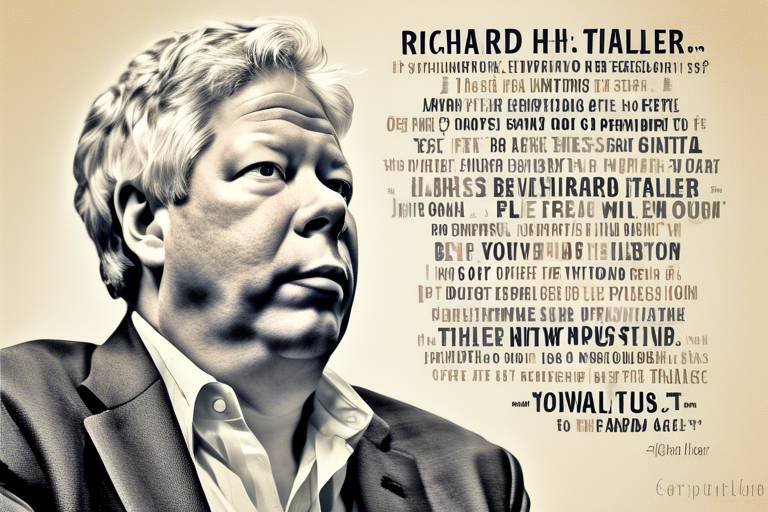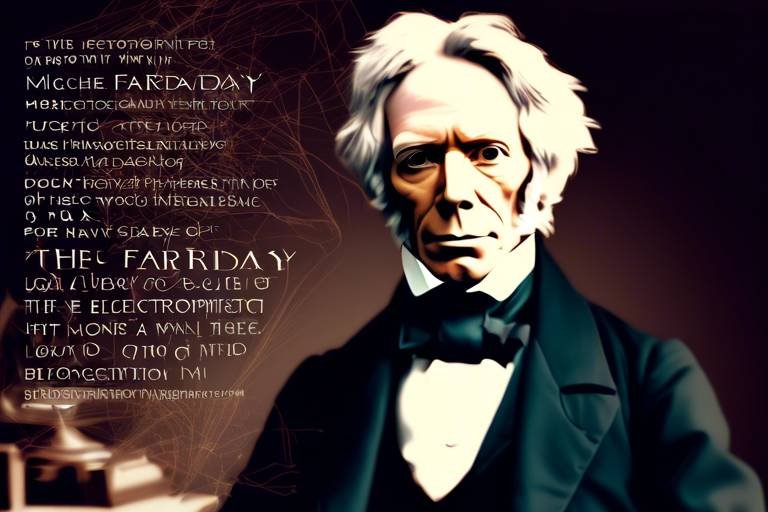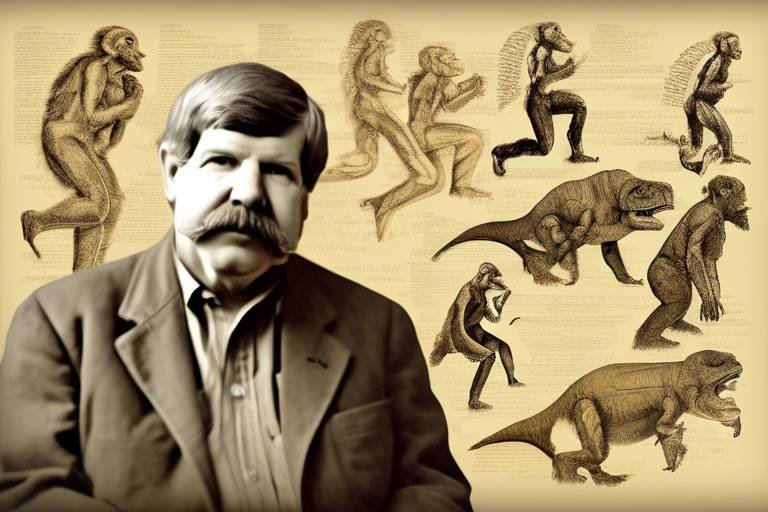The Contributions of Richard H. Thaler to Behavioral Finance
Richard H. Thaler, often regarded as the father of behavioral finance, has made remarkable contributions that have reshaped our understanding of economics and finance. His work bridges the gap between psychology and economics, providing crucial insights into how people make financial decisions. Unlike traditional economic theories that assume rational behavior, Thaler's research emphasizes the psychological factors that drive investor behavior and market outcomes. This article explores Thaler's groundbreaking theories, key publications, and the lasting implications of his work on economic practices.
To appreciate Thaler's impact, it's vital to grasp the principles of behavioral finance. This field challenges the notion that individuals always act rationally when making financial decisions. Instead, Thaler posits that our choices are often influenced by cognitive biases and emotional responses. For instance, when faced with uncertainty, investors might cling to past experiences or succumb to herd behavior, leading to irrational market fluctuations. Thaler's work encourages us to consider how human psychology affects economic outcomes, paving the way for a more nuanced understanding of financial markets.
Thaler introduced several transformative theories that have significantly altered our understanding of economic decision-making. Among these, mental accounting, the endowment effect, and prospect theory stand out as pivotal concepts that challenge traditional economic assumptions.
Mental accounting is a fascinating concept that describes how individuals categorize and evaluate financial outcomes. According to Thaler, people tend to compartmentalize their finances into different "accounts," treating money differently based on its source or intended use. For example, an individual might be more willing to spend a bonus on a luxury item rather than using their regular salary for the same purchase. This behavior can lead to suboptimal financial decisions, as individuals fail to consider their overall financial situation. Understanding mental accounting can help individuals make more informed choices about spending and saving.
The framing effect is another critical aspect of Thaler's research. It illustrates how the presentation of information can significantly influence decision-making. For instance, consider two scenarios: one where a financial product is described as having a 90% success rate versus another where it has a 10% failure rate. Even though both statements convey the same information, the way they are framed can lead to different perceptions of risk and reward. Thaler's findings highlight the importance of context in financial choices, reminding us that how we present information can shape outcomes.
By understanding mental accounting and the framing effect, individuals can develop better personal finance strategies. For instance, people can create separate budgets for different categories of spending, allowing them to track their finances more effectively. Additionally, being aware of how information is framed can help consumers make more rational decisions, leading to better investment choices. Thaler's insights provide practical applications that can enhance financial well-being.
The endowment effect is another intriguing phenomenon explored by Thaler. It refers to the tendency for individuals to assign greater value to items they own simply because they possess them. This can lead to irrational behavior, such as refusing to sell a product for a price higher than what they originally paid, even if market conditions have changed. Thaler's exploration of the endowment effect sheds light on consumer behavior and market dynamics, illustrating how ownership can distort our perception of value.
Thaler's contributions are encapsulated in several influential works that have popularized behavioral finance concepts. Two of his most significant publications, Nudge and Misbehaving, have made a lasting impact on both academia and practical applications in economics.
In Nudge, co-authored with Cass Sunstein, Thaler introduces the concept of libertarian paternalism. This idea emphasizes how subtle changes in policy can encourage individuals to make better decisions without restricting their freedom of choice. For example, automatically enrolling employees in retirement savings plans can significantly increase participation rates while still allowing individuals the option to opt-out. Thaler's work in this area has profound implications for public policy and personal finance.
In his book Misbehaving, Thaler chronicles the evolution of behavioral economics, providing a comprehensive overview of his research and the field's development. This book is not only an insightful read for academics but also accessible to general readers interested in understanding the psychological underpinnings of economic behavior. Thaler's engaging writing style and relatable anecdotes make complex concepts easier to grasp, inviting readers to reconsider their own financial decisions.
Thaler's contributions have significantly influenced both academic and practical aspects of economics. His theories have been integrated into economic policies and financial practices globally, prompting a shift in how we approach economic modeling and decision-making. As more professionals recognize the importance of behavioral insights, Thaler's work continues to inspire new research and applications in various fields, from marketing to public policy.
- What is behavioral finance? Behavioral finance is a field that examines how psychological factors influence financial decision-making and market outcomes.
- Who is Richard H. Thaler? Richard H. Thaler is a renowned economist known for his pioneering work in behavioral finance and for co-authoring influential books like Nudge and Misbehaving.
- What are some key concepts introduced by Thaler? Key concepts include mental accounting, the endowment effect, and the framing effect, all of which challenge traditional economic assumptions.

The Foundations of Behavioral Finance
Understanding the principles of behavioral finance is essential for grasping how psychological factors shape financial decisions. Richard H. Thaler, a pioneer in this field, challenged the traditional economic theories that assume humans are perfectly rational decision-makers. Instead, he illuminated the ways in which our emotions, biases, and cognitive limitations affect our behavior in financial markets. Imagine trying to navigate a maze blindfolded; this is akin to the experience of investors who are often swayed by irrational thoughts rather than clear, logical reasoning.
Thaler's work emphasizes that investor behavior is not just a product of mathematical models but is deeply influenced by psychological elements. For instance, when faced with a financial decision, individuals may rely on heuristics—mental shortcuts that simplify complex problems. While these shortcuts can be useful, they often lead to systematic errors. Consider this: when people are asked to choose between a guaranteed $50 and a 50% chance of winning $100, many will opt for the latter, despite the expected value being the same. This behavior highlights the impact of risk perception and how it can skew rational decision-making.
Moreover, Thaler introduced the concept of bounded rationality, which suggests that while individuals strive to make rational choices, their cognitive limitations often impede this process. This idea is crucial in understanding market anomalies—situations where actual market behavior deviates from what traditional economic theories would predict. In essence, Thaler's insights reveal that human behavior is often a cocktail of emotions and biases, leading to unpredictable market outcomes.
Thaler's work also underscores the importance of context in decision-making. For instance, the way options are presented can significantly influence choices. This phenomenon is known as the framing effect, where the same information can lead to different decisions depending on how it is framed. This insight is vital for both investors and policymakers, as it suggests that small changes in presentation can lead to more favorable outcomes in financial decision-making.
In summary, the foundations of behavioral finance, as established by Richard H. Thaler, challenge the notion of the rational investor. They highlight the intricate ways in which psychological factors shape our financial decisions, leading to outcomes that often defy traditional economic logic. By recognizing the impact of emotions, biases, and the framing of information, we can better navigate the complex world of finance.

Key Theories Introduced by Thaler
Richard H. Thaler has introduced several groundbreaking theories that have fundamentally changed our understanding of finance and economics. One of the most significant contributions is the concept of mental accounting, which examines how individuals categorize their financial resources. Imagine a person who receives a bonus at work; they might treat that money differently than their regular paycheck. Thaler's research shows that people often create mental "budgets" for different types of income, leading to irrational spending and saving behaviors. This compartmentalization can result in decisions that contradict their overall financial goals, as individuals may splurge their 'fun money' while being overly frugal with their savings.
Another pivotal concept introduced by Thaler is the endowment effect. This phenomenon illustrates how ownership influences our perception of value. Have you ever noticed how people tend to overvalue their possessions simply because they own them? This effect can lead to suboptimal decision-making in markets, as individuals may hold onto assets longer than they should, simply because they have an emotional attachment to them. Thaler's exploration of this concept sheds light on consumer behavior, revealing why people often resist selling items at fair market prices.
Thaler also delves into prospect theory, which he co-developed with Daniel Kahneman. This theory challenges the traditional economic assumption that individuals are rational actors. Instead, prospect theory posits that people evaluate potential losses and gains differently, often exhibiting loss aversion; that is, the pain of losing is psychologically more impactful than the pleasure of gaining. This insight has profound implications for understanding market fluctuations and investor behavior, as it explains why investors might hold onto losing stocks longer than they should, hoping to avoid the pain of realizing a loss.
Mental accounting, as previously mentioned, is a fascinating concept. It suggests that people do not treat all money as equal. For example, consider the following scenarios:
- A person might feel comfortable spending a tax refund on a vacation, but would hesitate to spend the same amount from their savings.
- Individuals may allocate funds for specific purposes, such as a 'vacation fund' or a 'home improvement fund', which can lead to irrational financial behaviors.
This compartmentalization can lead to decisions that are not aligned with one’s overall financial health. By understanding mental accounting, individuals can develop better strategies for budgeting and investment, ensuring that they are making choices that serve their long-term financial goals.
Thaler's research also highlights the importance of framing in decision-making. The way information is presented can significantly influence choices, often leading to different outcomes based on context. For instance, consider a scenario where a financial product is advertised with a 90% success rate versus one that highlights a 10% failure rate. Even though both statements convey the same information, the framing can lead to drastically different perceptions of risk. Understanding this can empower consumers to make more informed decisions, as they learn to recognize how framing might distort their views.
The insights gained from Thaler's theories can lead to practical applications in personal finance. By recognizing the effects of mental accounting, individuals can create more effective budget strategies. For instance, they could consolidate their financial resources into fewer categories, which might help them avoid irrational spending. Similarly, by understanding the endowment effect, consumers can be more mindful when evaluating their possessions and make more rational decisions about buying and selling.
In summary, Richard H. Thaler's key theories have not only reshaped the field of behavioral finance but also provided valuable tools for individuals looking to improve their financial decision-making. By understanding these concepts, we can navigate the complexities of our financial lives with greater clarity and intention.
What is mental accounting?
Mental accounting refers to the cognitive process where individuals categorize and evaluate financial outcomes differently based on their perceived purpose of the money. This can lead to irrational financial behaviors.
How does the endowment effect influence consumer behavior?
The endowment effect is the tendency for people to assign greater value to items they own, which can lead to suboptimal decisions in buying and selling. Owners may resist selling items at fair market prices due to emotional attachment.
What is prospect theory?
Prospect theory is a behavioral economic theory that describes how individuals evaluate potential losses and gains. It suggests that losses are felt more acutely than gains, leading to loss aversion, which can affect investment decisions.
How can Thaler's theories improve personal finance strategies?
By understanding concepts like mental accounting and the endowment effect, individuals can develop better budgeting strategies and make more rational financial decisions, ultimately leading to improved financial health.

Mental Accounting
Mental accounting is a fascinating concept introduced by Richard H. Thaler that delves into how individuals categorize their financial resources. Imagine you’ve just received a bonus at work. How do you decide to spend it? Do you treat it like your regular paycheck, or do you view it as "extra" money that can be splurged on something special? This is where mental accounting comes into play. Thaler's research shows that people often compartmentalize their money into different "accounts," which can lead to irrational financial decisions.
For instance, individuals might have separate mental accounts for their savings, entertainment, and daily expenses. This division can significantly impact how they perceive gains and losses. When they receive a windfall, such as a tax refund, they might allocate it to a luxury purchase rather than saving it, simply because it feels like "found money." Conversely, if they have a budget for dining out but overspend, they might cut back on groceries to compensate, even though these categories should ideally be viewed in a holistic manner.
Thaler's insights into mental accounting reveal that the way we frame our finances can alter our behavior. It’s similar to how a child might treat their birthday money differently than their allowance. The birthday money feels like a gift, while the allowance is seen as a necessity. This compartmentalization can lead to suboptimal financial choices, as individuals might prioritize spending in one area while neglecting others. Understanding this concept can empower individuals to make more informed financial decisions by recognizing the arbitrary boundaries they set around their money.
To illustrate the concept further, consider the following table that highlights how mental accounting affects various aspects of financial decision-making:
| Mental Account Type | Typical Behavior | Impact on Financial Decisions |
|---|---|---|
| Windfall Gains | Spending on luxuries | May lead to unplanned expenses |
| Budgeted Expenses | Strict adherence to limits | Can cause stress if over budget |
| Savings | Setting aside for future | Encourages long-term planning |
By recognizing the influence of mental accounting, individuals can better navigate their financial landscapes. Instead of treating money as separate entities, they can adopt a more integrated approach to budgeting and spending. This shift in perspective can lead to improved financial health and more rational decision-making.
- What is mental accounting?
Mental accounting is the tendency of individuals to categorize and treat money differently based on subjective criteria, impacting their financial decisions. - How does mental accounting affect spending?
It can lead to irrational spending behaviors, such as treating windfall gains as "extra" money that can be freely spent. - Can understanding mental accounting improve financial decisions?
Yes, by recognizing how they compartmentalize their finances, individuals can make more informed and holistic financial choices.

The Role of Framing
The concept of framing is one of the most fascinating aspects of behavioral finance, and it plays a crucial role in how individuals make decisions. At its core, framing refers to the way information is presented, which can significantly influence our perceptions and choices. Imagine you're shopping for a new car. If a salesperson highlights that a vehicle gets 30 miles per gallon, you might feel it's an economical choice. However, if they frame it as consuming 3 gallons per 100 miles, your perception might shift, making it seem less appealing. This simple switch in presentation can lead to vastly different decisions, showcasing the power of framing.
Thaler's research illustrates that the framing effect can alter our understanding of risk and reward. For instance, consider a scenario where investors are presented with two investment options: one that promises a 70% chance of gaining $1,000 and another that offers a 30% chance of losing $1,000. Even though these options might mathematically represent the same risk, the way they are framed can lead to different emotional responses. When framed positively, the prospect of gain can be more enticing, while a negative frame can invoke fear, pushing investors away from potentially lucrative opportunities.
This phenomenon is not limited to financial decisions; it extends to various aspects of life, from health choices to consumer behavior. For example, a health campaign that frames a new diet as “losing 10 pounds” may motivate individuals more effectively than one that focuses on “avoiding weight gain”. The positive framing encourages action, while the negative framing may lead to inaction due to fear of failure.
Understanding the role of framing can empower individuals to make better decisions. By recognizing how information is presented, we can consciously choose to reframe our thoughts and decisions. For instance, when faced with a tough financial decision, instead of focusing on potential losses, one might frame the situation in terms of the benefits of a wise investment. This shift in perspective can lead to more favorable outcomes.
In summary, the framing effect is a powerful tool that shapes our decision-making processes. Richard Thaler’s insights into framing remind us that we are not just rational actors in the financial world; we are emotional beings influenced by how choices are presented. By becoming aware of this influence, we can navigate our financial decisions more effectively and make choices that align better with our long-term goals.

Implications for Personal Finance
Understanding Richard H. Thaler's theories, especially mental accounting, can significantly enhance our personal finance strategies. Imagine you’ve received a bonus at work. How do you feel about spending that money compared to your regular paycheck? Thaler's insights suggest that you might treat that bonus differently, considering it "extra" money, which can lead to less cautious spending. This phenomenon is a classic example of mental accounting, where individuals categorize their finances into different mental buckets. By recognizing this tendency, you can make more informed decisions about how to allocate your resources.
For instance, if you view your savings as a separate entity, you might be less inclined to dip into it for impulse purchases. Instead, you can create distinct categories for your spending, such as "essentials," "savings," and "fun money." This separation can help you maintain discipline in your financial habits. Additionally, understanding the endowment effect can also reshape your approach to investments. When you own an asset, like a stock or a piece of real estate, you might overvalue it simply because it’s yours. Recognizing this bias can encourage you to evaluate your investments more objectively, making it easier to sell underperforming assets.
Moreover, Thaler's work emphasizes the importance of framing in decision-making. How you present financial information to yourself can alter your perceptions and choices. For example, if you frame your monthly budget as a challenge to save rather than a restriction on spending, you might find yourself more motivated to stick to it. This simple shift in perspective can lead to better financial outcomes.
To illustrate, consider the following table that summarizes practical applications of Thaler's theories in personal finance:
| Theory | Application | Benefit |
|---|---|---|
| Mental Accounting | Create separate budgets for different spending categories. | Improved financial discipline and awareness. |
| Endowment Effect | Regularly reassess the value of owned assets. | Better investment decisions and asset management. |
| Framing Effect | Present financial goals in a positive light. | Increased motivation and commitment to financial plans. |
Incorporating these insights into your daily financial practices can lead to more effective budgeting, saving, and investing. By acknowledging the psychological factors at play, you can take control of your financial journey and make decisions that align with your long-term goals. Remember, personal finance is not just about numbers; it's about understanding the human behavior that drives those numbers. So, the next time you’re faced with a financial decision, think about how mental accounting, the endowment effect, and framing might influence your choice. It could be the difference between a sound financial decision and a costly mistake.
- What is mental accounting? Mental accounting is a concept introduced by Richard H. Thaler that explains how people categorize and evaluate financial outcomes, often leading to irrational financial behavior.
- How does the endowment effect influence my spending? The endowment effect causes individuals to assign greater value to items they own, which can lead to overvaluing assets and making less rational investment decisions.
- Can Thaler's theories help with budgeting? Yes! By applying mental accounting, you can create separate budgets for different categories, leading to better financial discipline.

Endowment Effect
The is a fascinating psychological phenomenon that reveals how ownership can distort our perception of value. Imagine you have a favorite mug that you bought for just $5. Now, if someone offers you $10 for it, you might hesitate. Why? Because that mug, which you’ve held and used, feels more valuable to you than it does to anyone else. This is the crux of the endowment effect—people tend to assign a higher value to things merely because they own them.
Richard H. Thaler's exploration of this concept has profound implications for understanding consumer behavior and market dynamics. The endowment effect can explain why people are often reluctant to sell items they own, even when they could benefit financially from doing so. It’s like having a favorite pair of shoes that you know you don’t wear anymore; you might still hold onto them because they hold sentimental value or because you simply can’t bring yourself to part with them.
Thaler's research suggests that this psychological bias can lead to irrational decision-making. For instance, in a marketplace, sellers may overprice their goods based on their ownership, while buyers may undervalue them because they lack the same emotional attachment. This misalignment can lead to inefficiencies in the market, where goods do not exchange hands as freely as they should.
To illustrate the endowment effect further, consider the following example:
| Scenario | Owner's Price | Buyer's Price |
|---|---|---|
| Owned Coffee Mug | $10 | $5 |
| New Coffee Mug | $5 | $5 |
In the table above, we see how the owner values their coffee mug at $10 simply because they own it, while a potential buyer values it at only $5. This discrepancy highlights the endowment effect in action.
Understanding the endowment effect can also help in various fields, including marketing and negotiation. For example, businesses can leverage this bias by offering trial periods for products. When consumers get a taste of ownership, they are more likely to perceive the product as valuable, increasing the chances of a sale. Similarly, in negotiations, being aware of the endowment effect can help parties understand the emotional stakes involved, leading to more effective discussions and agreements.
In conclusion, the endowment effect is a powerful reminder of how our emotions and psychological biases can shape our economic decisions. Richard H. Thaler's insights into this phenomenon not only deepen our understanding of consumer behavior but also challenge traditional economic theories that assume rational decision-making. By recognizing the endowment effect, we can better navigate our financial choices and appreciate the complexities of human behavior in the marketplace.
- What is the endowment effect? The endowment effect is a psychological phenomenon where people assign higher value to items they own compared to items they do not own.
- How does the endowment effect influence consumer behavior? It can lead consumers to overvalue their possessions, making them reluctant to sell or trade items, even at a profit.
- Can the endowment effect be overcome? Yes, understanding this bias can help individuals make more rational decisions regarding their possessions and investments.

Thaler's Key Publications
Richard H. Thaler has made remarkable contributions to the field of behavioral finance, and his key publications serve as a testament to his innovative thinking and impactful theories. Among his most significant works are Nudge and Misbehaving: The Making of Behavioral Economics, which have not only popularized behavioral finance concepts but also reshaped how we understand economic decision-making.
Nudge, co-authored with Cass Sunstein, introduces a fascinating concept known as libertarian paternalism. This theory suggests that by subtly altering the way choices are presented, we can guide people towards better decisions without limiting their freedom. Imagine walking into a cafeteria where the healthier food options are placed at eye level; this simple nudge can lead to healthier eating habits without forcing anyone to make a specific choice. Thaler and Sunstein argue that such gentle nudges can have profound effects on public policy and individual behavior.
In Misbehaving, Thaler chronicles his journey through the development of behavioral economics. This book is not just a collection of academic theories; it's a narrative that blends personal anecdotes with rigorous research, making it accessible and engaging. Thaler takes readers through the evolution of behavioral economics, highlighting the moments that shaped the field. He challenges the traditional economic assumption that humans are entirely rational beings, illustrating how emotions and cognitive biases often lead us astray. Through captivating stories and real-world examples, Thaler invites readers to reconsider how they view economic behaviors.
Both of these works have left an indelible mark on the academic community and beyond. They have sparked discussions about how behavioral insights can be applied in various fields, from public health to finance. Thaler's publications emphasize the importance of understanding human behavior in economic contexts, encouraging policymakers and individuals alike to rethink their approaches to decision-making.
| Publication | Co-author | Year | Key Concept |
|---|---|---|---|
| Nudge | Cass Sunstein | 2008 | Libertarian Paternalism |
| Misbehaving | N/A | 2015 | Behavioral Economics Evolution |
Thaler's key publications are not just academic milestones; they are crucial tools for understanding the complexities of human behavior in economic settings. By blending psychology with economics, Thaler has opened up new avenues for research and practical application, making his work invaluable for anyone interested in the intricacies of decision-making.
- What is the main idea behind Thaler's Nudge theory?
Thaler's Nudge theory emphasizes that small changes in how choices are presented can significantly influence people's decisions without restricting their freedom. - How does Misbehaving contribute to behavioral economics?
In Misbehaving, Thaler provides a comprehensive overview of the development of behavioral economics, showcasing how human behavior often deviates from traditional economic predictions. - Why are Thaler's publications important?
Thaler's work is crucial because it challenges the assumption of rational decision-making in economics and highlights the role of psychological factors in financial behaviors.

Nudge
The concept of , co-authored by Richard H. Thaler and Cass Sunstein, is a fascinating exploration of how subtle changes in the way choices are presented can significantly influence our decisions. Imagine walking into a cafeteria where the healthy food options are placed at eye level while the less healthy options are tucked away at the bottom. This simple adjustment can nudge people towards making better dietary choices without restricting their freedom to choose. It's this blend of psychology and economics that makes Thaler's work so groundbreaking.
At its core, Nudge Theory is rooted in the idea of libertarian paternalism. This term might sound a bit paradoxical, but it essentially means that while individuals should have the freedom to make their own choices, we can still guide them towards better decisions through carefully designed choice architectures. The beauty of this approach lies in its non-intrusive nature. Rather than imposing regulations or bans, Thaler suggests that we can improve outcomes by simply changing the context in which choices are made.
For example, consider how retirement savings plans are structured. If employees are automatically enrolled in a retirement savings plan, they are more likely to participate than if they have to opt-in themselves. This is a classic nudge that can lead to significant long-term benefits for individuals and society as a whole. The implications of this theory extend far beyond personal finance; they can be applied in areas like public health, environmental policy, and even education.
Thaler and Sunstein emphasize that nudges should be designed with the public's best interest in mind. They advocate for policies that help people make better choices while still allowing them the autonomy to decide for themselves. In this way, nudging can be seen as a tool for enhancing welfare without compromising individual freedom. The challenge, however, lies in ensuring that these nudges are ethical and transparent.
To better understand the practical applications of Nudge Theory, let's look at some real-world examples:
| Application | Description |
|---|---|
| Healthier Eating | Reorganizing cafeteria layouts to promote nutritious food choices. |
| Retirement Savings | Automatic enrollment in retirement plans to increase participation rates. |
| Organ Donation | Switching from opt-in to opt-out systems to boost donor rates. |
As we continue to navigate complex decisions in our daily lives, the principles of Nudge Theory remind us that small changes can lead to significant outcomes. Thaler's insights not only challenge traditional economic thought but also provide practical tools for improving decision-making across various sectors. By understanding how our choices can be influenced, we can create environments that foster better outcomes for individuals and society as a whole.
- What is Nudge Theory? Nudge Theory is a concept in behavioral economics that suggests small changes in the way choices are presented can significantly influence people's decisions.
- Who developed Nudge Theory? Nudge Theory was developed by Richard H. Thaler and Cass Sunstein.
- How can Nudge Theory be applied? It can be applied in various fields such as public health, finance, and education to encourage better decision-making without restricting freedom of choice.
- What is libertarian paternalism? Libertarian paternalism is the idea that it's possible to influence people's choices in a way that improves their welfare while still preserving their freedom to choose.

and
This article explores Richard H. Thaler's significant impact on behavioral finance, highlighting his groundbreaking theories, key publications, and the implications of his work on economics and finance practices.
Understanding the principles of behavioral finance is essential. This section delves into how Thaler's work challenged traditional economic theories, emphasizing the psychological factors that influence investor behavior and market outcomes. Traditional economics often assumes that individuals are rational and make decisions solely based on available information. However, Thaler's research has shown that this is far from the truth. People are often swayed by emotions, biases, and irrational thoughts, leading to decisions that deviate from what would be considered logical or optimal. By integrating psychology into the financial decision-making process, Thaler has opened up a new lens through which we can view economic behavior.
Thaler introduced several transformative theories in behavioral finance. Here, we examine concepts such as mental accounting, the endowment effect, and prospect theory, which have reshaped our understanding of economic decision-making. Each of these theories provides insights into how individuals perceive value and make financial choices, often in ways that contradict traditional economic predictions.
Mental accounting refers to the way individuals categorize and evaluate financial outcomes. Thaler's insights into this concept reveal how people compartmentalize their money, affecting spending and saving behaviors. For instance, a person might treat money won from a lottery differently than money earned from their job, even though, economically, they are the same. This compartmentalization can lead to irrational financial decisions, such as splurging on a luxury item with "extra" money while being overly frugal with their salary.
The framing effect illustrates how the presentation of information influences decisions. Thaler's research shows that context can significantly alter perceptions of risk and reward, impacting financial choices. For example, if an investment is presented as having a 90% chance of success versus a 10% chance of failure, individuals are more likely to invest, even though the two statements convey the same information. This highlights the importance of how information is framed and its potential to skew rational decision-making.
Understanding mental accounting can lead to better personal finance strategies. By recognizing how we mentally categorize our finances, we can make more informed decisions about budgeting and investments. For example, allocating a specific budget for entertainment can prevent overspending in that area, while also allowing us to enjoy our money without guilt. Thaler's theories encourage individuals to reflect on their financial habits and adjust them for better outcomes.
The endowment effect describes how people assign greater value to items merely because they own them. Thaler's exploration of this phenomenon provides insights into consumer behavior and market dynamics. This effect can lead to irrational decision-making, such as holding onto an asset longer than necessary because of the emotional attachment to it. Understanding the endowment effect can help individuals and businesses make better decisions regarding buying and selling assets.
Thaler's contributions are encapsulated in several influential works. This section highlights his most significant publications, including Nudge and Misbehaving, which have popularized behavioral finance concepts. These books have not only influenced academia but also practical applications in policy-making and business strategies.
Nudge, co-authored with Cass Sunstein, introduces the idea of libertarian paternalism. It emphasizes how subtle policy shifts can encourage better decision-making without restricting freedom of choice. The concept of nudging has been widely adopted in various fields, from healthcare to finance, demonstrating how small changes can lead to significant improvements in behavior.
In Misbehaving, Thaler chronicles the development of behavioral economics. This book provides a comprehensive overview of his research, offering readers insights into the evolution of the field. It serves as both a memoir and a textbook, making it accessible to a broad audience. Thaler's storytelling ability, combined with his rigorous research, makes this work a must-read for anyone interested in understanding the complexities of human behavior in economic contexts.
Thaler's contributions have significantly influenced both academic and practical aspects of economics. This section examines how his theories have been integrated into economic policies and financial practices globally. From shaping government policies to influencing corporate strategies, Thaler's work has demonstrated that understanding human behavior is crucial for effective economic decision-making.
- What is behavioral finance? Behavioral finance is a field that combines psychology and economics to understand how psychological factors influence financial decision-making.
- What are some key theories introduced by Richard Thaler? Key theories include mental accounting, the endowment effect, and the framing effect.
- How has Thaler influenced personal finance strategies? Thaler's work encourages individuals to reflect on their financial habits and make informed decisions based on psychological insights.
- What is the significance of the book "Nudge"? "Nudge" introduces the concept of libertarian paternalism, emphasizing how small changes can lead to better decision-making without limiting choices.

Misbehaving,
In Misbehaving, Richard H. Thaler takes readers on an engaging journey through the evolution of behavioral economics, a field he helped pioneer. This book is not just a collection of theories; it's a narrative that intertwines personal anecdotes, rigorous research, and a touch of humor to illustrate how human behavior often deviates from traditional economic models. Thaler masterfully argues that the classic notion of the rational economic agent is more fiction than fact. Instead, he presents a world where people are influenced by a variety of psychological factors, biases, and irrationalities that shape their financial decisions.
One of the standout features of Misbehaving is Thaler's ability to simplify complex concepts. He breaks down the intricate ideas behind behavioral finance into digestible pieces, making it accessible for both academics and the general public. Through relatable examples and case studies, he demonstrates how everyday decisions—like spending, saving, and investing—are often influenced by emotions and cognitive biases. This approach not only enhances understanding but also encourages readers to reflect on their own financial behaviors.
Thaler also emphasizes the importance of experimentation in behavioral economics, showcasing how real-world observations and experimental data can lead to a deeper understanding of economic behavior. For instance, he discusses various experiments that reveal how people tend to make decisions based on perceived gains and losses rather than absolute outcomes. This perspective is crucial for anyone looking to navigate the complexities of personal finance and investment strategies.
Another significant aspect of Misbehaving is its critique of traditional economic theories. Thaler challenges the assumption that markets are always efficient and that individuals always act in their best interests. He highlights the frequent disconnect between theory and reality, pointing out that people often make decisions based on emotions, social influences, and cognitive limitations. This insight has profound implications for policymakers, financial advisors, and anyone involved in economic decision-making.
To illustrate these points, Thaler presents a variety of real-life scenarios where behavioral economics plays a crucial role. For example, he discusses how retirement savings plans can be structured to nudge individuals toward better savings behavior. By understanding the principles of behavioral finance, organizations can design policies that help people make better financial choices without restricting their freedom.
Ultimately, Misbehaving serves as both a memoir and a manifesto for behavioral economics. Thaler's engaging writing style, combined with his wealth of knowledge, makes this book a must-read for anyone interested in understanding the complexities of human behavior in economic contexts. Whether you're a student, a professional, or just someone curious about why we make certain financial choices, Thaler's insights will leave you with a deeper appreciation of the interplay between psychology and economics.
- What is the main premise of "Misbehaving"?
The main premise of "Misbehaving" is that human behavior often deviates from traditional economic theories, which assume rational decision-making. Thaler illustrates how psychological factors and cognitive biases affect financial choices. - How does Thaler's work impact personal finance?
Thaler's work encourages individuals to recognize their behavioral biases, leading to better personal finance strategies, such as improved budgeting and investment decisions. - What are some key concepts introduced in "Misbehaving"?
Key concepts include mental accounting, the endowment effect, and the importance of framing in decision-making. - Why is "Misbehaving" considered important in the field of economics?
It is considered important because it challenges traditional economic models and provides a framework for understanding real-world financial behavior, influencing both academic research and practical financial applications.

which have popularized behavioral finance concepts.
This article explores Richard H. Thaler's significant impact on behavioral finance, highlighting his groundbreaking theories, key publications, and the implications of his work on economics and finance practices.
Understanding the principles of behavioral finance is essential. This section delves into how Thaler's work challenged traditional economic theories, emphasizing the psychological factors that influence investor behavior and market outcomes.
Thaler introduced several transformative theories in behavioral finance. Here, we examine concepts such as mental accounting, the endowment effect, and prospect theory, which have reshaped our understanding of economic decision-making.
Mental accounting refers to the way individuals categorize and evaluate financial outcomes. Thaler's insights into this concept reveal how people compartmentalize their money, affecting spending and saving behaviors.
The framing effect illustrates how the presentation of information influences decisions. Thaler's research shows that context can significantly alter perceptions of risk and reward, impacting financial choices.
Understanding mental accounting can lead to better personal finance strategies. This section discusses practical applications of Thaler's theories in budgeting and investment decisions.
The endowment effect describes how people assign greater value to items merely because they own them. Thaler's exploration of this phenomenon provides insights into consumer behavior and market dynamics.
Thaler's contributions are encapsulated in several influential works. This section highlights his most significant publications, including Nudge and Misbehaving, which have popularized behavioral finance concepts.
Nudge, co-authored with Cass Sunstein, introduces the idea of libertarian paternalism. It emphasizes how subtle policy shifts can encourage better decision-making without restricting freedom of choice.
In Misbehaving, Thaler chronicles the development of behavioral economics. This book provides a comprehensive overview of his research, offering readers insights into the evolution of the field.
Thaler's contributions have significantly influenced both academic and practical aspects of economics. This section examines how his theories have been integrated into economic policies and financial practices globally.
Thaler's work has been instrumental in bringing behavioral finance into the mainstream. His publications, particularly Nudge and Misbehaving, have not only introduced complex theories in an accessible way but have also sparked widespread interest in how psychology intersects with economics. By presenting his ideas in a relatable manner, Thaler has made it easier for both academics and the general public to grasp the nuances of human behavior in financial contexts.
For instance, Nudge discusses how small changes in the way choices are presented can lead to significantly different outcomes in decision-making. This concept has been applied in various fields, from health care to personal finance, showcasing the practical implications of his theories. Similarly, Misbehaving chronicles the journey of behavioral economics, illustrating how traditional economic models often fail to account for the irrational behaviors exhibited by individuals. These publications have not only educated readers but have also influenced policymakers and businesses to rethink their strategies.
Moreover, Thaler's ability to weave anecdotes and real-world examples into his writings makes his concepts relatable. This storytelling approach captivates readers and encourages them to reflect on their own financial decisions. The impact of his work is evident in the growing acceptance of behavioral finance in academic curricula, financial advisory practices, and even government policies aimed at improving societal outcomes.
- What is behavioral finance? Behavioral finance is a field that combines psychology and economics to understand how emotional and cognitive biases affect financial decision-making.
- How did Richard H. Thaler contribute to behavioral finance? Thaler introduced key concepts such as mental accounting, the endowment effect, and nudge theory, which have reshaped our understanding of economic behavior.
- What are some key publications by Thaler? Notable works include Nudge and Misbehaving, which have popularized behavioral finance concepts and made them accessible to a broader audience.
- Why is Thaler's work important? His research has influenced both academic thought and practical applications in finance, helping to create more effective policies and strategies that consider human behavior.

Nudge Theory
Nudge Theory, co-authored by Richard H. Thaler and Cass Sunstein, is a fascinating concept that introduces the idea of libertarian paternalism. This theory suggests that we can influence people's choices in a way that leads them to make better decisions for themselves, without eliminating their freedom to choose. Imagine walking through a grocery store and noticing that the healthier food options are placed at eye level while the sugary snacks are relegated to the bottom shelves. This subtle shift in presentation is a classic example of a nudge, guiding consumers towards healthier choices without mandating them to do so.
At its core, Nudge Theory operates on the principle that human decision-making is often flawed due to cognitive biases and emotional factors. Thaler and Sunstein argue that by understanding these biases, we can design environments that promote better decision-making. This is particularly relevant in areas such as public health, finance, and environmental policy, where small changes can lead to significant improvements in outcomes.
For instance, consider retirement savings. Many individuals struggle to save for retirement due to procrastination or lack of knowledge about investment options. By implementing automatic enrollment in retirement plans, organizations can nudge employees to save more effectively. Once employees are enrolled, they are more likely to remain in the plan and contribute regularly, simply because the default option is set to save. This approach respects individuals' freedom to opt-out but encourages them to make a choice that benefits their future.
Moreover, the implications of Nudge Theory extend beyond individual choices; they can influence societal norms. When governments or organizations adopt nudging strategies, they can create environments that promote desirable behaviors on a larger scale. For example, nudges can be employed to increase organ donation rates or encourage energy conservation among households. The key is to design interventions that are easy to implement and align with people's natural inclinations.
In summary, Nudge Theory represents a groundbreaking shift in how we think about decision-making. Rather than viewing individuals as purely rational actors, Thaler and Sunstein emphasize the importance of context and presentation in shaping choices. By leveraging insights from behavioral psychology, we can create systems that guide people towards better outcomes while preserving their autonomy.
- What is Nudge Theory? Nudge Theory suggests that small changes in the way choices are presented can significantly influence people's decisions without restricting their freedom to choose.
- Who developed Nudge Theory? Nudge Theory was developed by Richard H. Thaler and Cass Sunstein, who explored how behavioral insights can improve decision-making.
- How can Nudge Theory be applied in daily life? Nudge Theory can be applied in various areas, such as promoting healthier eating habits, encouraging savings for retirement, or increasing participation in beneficial programs.
- Is Nudge Theory ethical? Many argue that Nudge Theory is ethical as it respects individual freedom while guiding people towards choices that can improve their well-being.

Nudge,
Nudge, co-authored by Richard H. Thaler and Cass Sunstein, is a groundbreaking book that introduces the concept of libertarian paternalism. This idea might sound like a contradiction at first, but it beautifully encapsulates the notion that we can guide people towards better choices while still preserving their freedom to choose. Imagine you're at a buffet; you can pile your plate high with everything, but if the healthier options are at eye level, you're more likely to fill your plate with salad instead of fries. This subtle shift in how choices are presented is what a nudge is all about.
The authors argue that small changes in the way choices are framed can lead to significant improvements in decision-making. For instance, consider the way retirement savings plans are structured. By automatically enrolling employees in a retirement plan but allowing them the option to opt-out, companies can significantly increase participation rates. This is a perfect example of how nudges can help people make better financial decisions without coercing them. It's like giving someone a gentle push in the right direction rather than shoving them into a pool.
Thaler and Sunstein explore various domains where nudges can be applied, from healthcare to personal finance. They emphasize that the goal is not to limit choices but to make it easier for individuals to make decisions that are in their best interests. This approach has profound implications for public policy and personal behavior. For example, when people are presented with a default option for organ donation that assumes consent unless stated otherwise, it can lead to higher rates of organ donations without infringing on personal choice.
One of the key takeaways from Nudge is that human behavior is often irrational, and understanding this irrationality can lead to better outcomes. Thaler's work encourages policymakers and businesses to think creatively about how they present choices and information. By recognizing the psychological factors that influence our decisions, we can create environments that promote better financial health, healthier lifestyles, and more informed choices.
In essence, Nudge serves as a call to action for everyone—from policymakers to everyday individuals—to rethink how we approach decision-making. It reminds us that sometimes, all it takes is a little nudge to steer us in the right direction, making the world a better place for everyone.
- What is the main idea of the book Nudge?
The book introduces the concept of libertarian paternalism, which suggests that small changes in how choices are presented can significantly influence people's decisions without restricting their freedom to choose. - How can nudges be applied in real life?
Nudges can be applied in various domains such as healthcare, finance, and public policy. For example, automatic enrollment in retirement savings plans can increase participation rates. - What are some examples of nudges?
Examples include placing healthier foods at eye level in stores, default options for organ donation, and simplifying forms for signing up for services. - Can nudges really change behavior?
Yes, research has shown that well-designed nudges can lead to better decision-making and improved outcomes in various aspects of life.

co-authored with Cass Sunstein, introduces the idea of
This article explores Richard H. Thaler's significant impact on behavioral finance, highlighting his groundbreaking theories, key publications, and the implications of his work on economics and finance practices.
Understanding the principles of behavioral finance is essential. This section delves into how Thaler's work challenged traditional economic theories, emphasizing the psychological factors that influence investor behavior and market outcomes.
Thaler introduced several transformative theories in behavioral finance. Here, we examine concepts such as mental accounting, the endowment effect, and prospect theory, which have reshaped our understanding of economic decision-making.
Mental accounting refers to the way individuals categorize and evaluate financial outcomes. Thaler's insights into this concept reveal how people compartmentalize their money, affecting spending and saving behaviors.
The framing effect illustrates how the presentation of information influences decisions. Thaler's research shows that context can significantly alter perceptions of risk and reward, impacting financial choices.
Understanding mental accounting can lead to better personal finance strategies. This section discusses practical applications of Thaler's theories in budgeting and investment decisions.
The endowment effect describes how people assign greater value to items merely because they own them. Thaler's exploration of this phenomenon provides insights into consumer behavior and market dynamics.
Thaler's contributions are encapsulated in several influential works. This section highlights his most significant publications, including Nudge and Misbehaving, which have popularized behavioral finance concepts.
Nudge, co-authored with Cass Sunstein, introduces the idea of libertarian paternalism. This concept emphasizes how subtle policy shifts can encourage better decision-making without restricting freedom of choice. By leveraging our inherent biases and tendencies, nudges can lead individuals towards more beneficial outcomes without eliminating options. Imagine walking through a cafeteria where the healthier food choices are placed at eye level; this simple nudge can significantly influence dietary decisions. Thaler and Sunstein argue that such small changes in the environment can guide people towards choices that improve their lives, all while preserving their autonomy.
In Misbehaving, Thaler chronicles the development of behavioral economics. This book provides a comprehensive overview of his research, offering readers insights into the evolution of the field.
Thaler's contributions have significantly influenced both academic and practical aspects of economics. This section examines how his theories have been integrated into economic policies and financial practices globally.
- What is behavioral finance? Behavioral finance studies how psychological influences and cognitive biases affect the financial behaviors of individuals and institutions.
- How did Richard H. Thaler contribute to behavioral finance? Thaler introduced key concepts like mental accounting, the endowment effect, and prospect theory, which have reshaped our understanding of economic decision-making.
- What is the significance of the book "Nudge"? "Nudge" promotes the idea of libertarian paternalism, suggesting that small changes in policy can lead to better decision-making without restricting freedom of choice.
- How does the endowment effect impact consumer behavior? The endowment effect causes individuals to value items more highly simply because they own them, which can lead to irrational decision-making in buying and selling scenarios.

libertarian paternalism.
This article explores Richard H. Thaler's significant impact on behavioral finance, highlighting his groundbreaking theories, key publications, and the implications of his work on economics and finance practices.
Understanding the principles of behavioral finance is essential. This section delves into how Thaler's work challenged traditional economic theories, emphasizing the psychological factors that influence investor behavior and market outcomes.
Thaler introduced several transformative theories in behavioral finance. Here, we examine concepts such as mental accounting, the endowment effect, and prospect theory, which have reshaped our understanding of economic decision-making.
Mental accounting refers to the way individuals categorize and evaluate financial outcomes. Thaler's insights into this concept reveal how people compartmentalize their money, affecting spending and saving behaviors.
The framing effect illustrates how the presentation of information influences decisions. Thaler's research shows that context can significantly alter perceptions of risk and reward, impacting financial choices.
Understanding mental accounting can lead to better personal finance strategies. This section discusses practical applications of Thaler's theories in budgeting and investment decisions.
The endowment effect describes how people assign greater value to items merely because they own them. Thaler's exploration of this phenomenon provides insights into consumer behavior and market dynamics.
Thaler's contributions are encapsulated in several influential works. This section highlights his most significant publications, including Nudge and Misbehaving, which have popularized behavioral finance concepts.
Nudge, co-authored with Cass Sunstein, introduces the idea of libertarian paternalism. It emphasizes how subtle policy shifts can encourage better decision-making without restricting freedom of choice.
Libertarian paternalism is a fascinating concept that strikes a balance between freedom and guidance. It suggests that while individuals should have the freedom to make their own choices, there are ways to design policies that nudge them towards decisions that improve their well-being. Imagine it as a gentle hand guiding you through a maze, allowing you to choose your path but subtly encouraging you to take the more beneficial route.
Thaler and Sunstein argue that by structuring choices in a way that highlights the most beneficial options, we can help people make better decisions without taking away their freedom. This approach is particularly relevant in areas like health care, finance, and education. For instance, consider a retirement savings plan where the default option is to enroll employees automatically. While they can opt out, the default setting nudges them towards saving for their future, which is often in their best interest.
Here are some key features of libertarian paternalism:
- Choice Architecture: The way choices are presented can significantly impact the decisions people make.
- Defaults Matter: People tend to stick with default options, making it crucial to set beneficial defaults.
- Transparency: Policies should be clear and understandable, allowing individuals to make informed choices.
In essence, libertarian paternalism recognizes that while we all want the freedom to choose, a little nudge in the right direction can lead to better outcomes for everyone.
In Misbehaving, Thaler chronicles the development of behavioral economics. This book provides a comprehensive overview of his research, offering readers insights into the evolution of the field.
Thaler's contributions have significantly influenced both academic and practical aspects of economics. This section examines how his theories have been integrated into economic policies and financial practices globally.
Behavioral finance is a field that combines psychology and economics to understand how emotional and cognitive biases influence financial decision-making.
Richard Thaler introduced key theories such as mental accounting, the endowment effect, and prospect theory, which have reshaped how we understand economic behavior.
Libertarian paternalism is a concept that advocates for designing policies that nudge individuals towards better choices while still preserving their freedom to choose.
Thaler's publications, such as Nudge and Misbehaving, have popularized behavioral finance concepts and provided valuable insights into decision-making processes.

It emphasizes how subtle policy shifts can encourage better decision-making without restricting freedom of choice.
This article explores Richard H. Thaler's significant impact on behavioral finance, highlighting his groundbreaking theories, key publications, and the implications of his work on economics and finance practices.
Understanding the principles of behavioral finance is essential. This section delves into how Thaler's work challenged traditional economic theories, emphasizing the psychological factors that influence investor behavior and market outcomes.
Thaler introduced several transformative theories in behavioral finance. Here, we examine concepts such as mental accounting, the endowment effect, and prospect theory, which have reshaped our understanding of economic decision-making.
Mental accounting refers to the way individuals categorize and evaluate financial outcomes. Thaler's insights into this concept reveal how people compartmentalize their money, affecting spending and saving behaviors.
The framing effect illustrates how the presentation of information influences decisions. Thaler's research shows that context can significantly alter perceptions of risk and reward, impacting financial choices. For instance, if a financial product is presented as a "90% success rate," it may appear more attractive than one with a "10% failure rate," even though both statements convey the same information. This subtle shift in presentation can lead individuals to make better decisions without feeling coerced or restricted in their choices. Thaler emphasizes that by carefully designing the way options are presented, policymakers and businesses can nudge individuals towards beneficial behaviors.
Understanding mental accounting can lead to better personal finance strategies. This section discusses practical applications of Thaler's theories in budgeting and investment decisions.
The endowment effect describes how people assign greater value to items merely because they own them. Thaler's exploration of this phenomenon provides insights into consumer behavior and market dynamics.
Thaler's contributions are encapsulated in several influential works. This section highlights his most significant publications, including Nudge and Misbehaving, which have popularized behavioral finance concepts.
Nudge, co-authored with Cass Sunstein, introduces the idea of libertarian paternalism. It emphasizes how subtle policy shifts can encourage better decision-making without restricting freedom of choice.
In Misbehaving, Thaler chronicles the development of behavioral economics. This book provides a comprehensive overview of his research, offering readers insights into the evolution of the field.
Thaler's contributions have significantly influenced both academic and practical aspects of economics. This section examines how his theories have been integrated into economic policies and financial practices globally.
- What is behavioral finance? Behavioral finance studies the psychological influences on investors and markets, challenging traditional finance theories that assume rational behavior.
- How did Richard H. Thaler contribute to behavioral finance? Thaler introduced key concepts such as mental accounting, the endowment effect, and nudge theory, which have transformed our understanding of economic decision-making.
- What is nudge theory? Nudge theory suggests that subtle policy changes can guide individuals towards better decisions without limiting their freedom of choice.
- Why is mental accounting important? Mental accounting helps individuals organize their finances, affecting their spending and saving behaviors, which can lead to improved financial health.

Misbehaving: The Making of Behavioral Economics
is not just a book; it's a journey through the evolution of a field that challenges the traditional notions of economics. In this captivating work, Richard H. Thaler takes readers on a personal and intellectual odyssey, sharing how he and his colleagues began to question the long-standing assumptions of rationality in economic theory. Thaler's narrative is both engaging and enlightening, as he recounts the pivotal moments that shaped his thinking and the broader discipline of behavioral economics.
One of the most fascinating aspects of Misbehaving is its exploration of the early resistance Thaler faced from the mainstream economics community. Imagine being a pioneer in a field where your ideas are met with skepticism and dismissal! Thaler's determination to prove that human behavior is often irrational—yet predictable—led to groundbreaking insights that have forever changed how we understand economic decision-making. He illustrates this through relatable anecdotes and experiments that highlight the quirks of human psychology.
Throughout the book, Thaler emphasizes the importance of empirical research and real-world observations. He argues that traditional economic models, which often rely on the assumption of fully rational agents, fail to account for the complexities of human behavior. Thaler's work showcases how incorporating psychological insights can lead to a more accurate understanding of economic phenomena. For instance, he discusses how biases, heuristics, and emotional factors can significantly impact financial decisions, often leading individuals to make choices that contradict their best interests.
Thaler also introduces readers to key concepts that have become foundational in behavioral economics. These include:
- Mental Accounting: How individuals categorize their finances and the implications this has on spending and saving.
- Loss Aversion: The idea that people prefer to avoid losses rather than acquiring equivalent gains, which can lead to risk-averse behavior.
- Framing Effects: How the way information is presented can influence decision-making processes.
By weaving personal anecdotes with rigorous research, Thaler makes complex theories accessible and relatable. He invites readers to reflect on their own financial behaviors and recognize the irrationalities that often govern their choices. This approach not only educates but also empowers individuals to make better financial decisions by understanding the psychological traps that can lead them astray.
In conclusion, Misbehaving serves as a cornerstone text in behavioral economics, illustrating how Thaler's work has reshaped our understanding of human behavior in economic contexts. It challenges us to rethink the principles that govern our financial lives and encourages a more nuanced approach to economics—one that acknowledges the messy, unpredictable nature of human decision-making.
What is the main theme of "Misbehaving"?
The main theme of "Misbehaving" is to explore how human behavior often deviates from traditional economic theories, emphasizing the role of psychological factors in decision-making.
Who co-authored "Nudge" with Richard Thaler?
Richard Thaler co-authored "Nudge" with Cass Sunstein, introducing the concept of libertarian paternalism.
How has Thaler's work influenced personal finance?
Thaler's insights into behavioral finance have led to practical applications in personal finance, such as better budgeting strategies and investment decisions influenced by understanding mental accounting.

Misbehaving,
This article explores Richard H. Thaler's significant impact on behavioral finance, highlighting his groundbreaking theories, key publications, and the implications of his work on economics and finance practices.
Understanding the principles of behavioral finance is essential. This section delves into how Thaler's work challenged traditional economic theories, emphasizing the psychological factors that influence investor behavior and market outcomes.
Thaler introduced several transformative theories in behavioral finance. Here, we examine concepts such as mental accounting, the endowment effect, and prospect theory, which have reshaped our understanding of economic decision-making.
Mental accounting refers to the way individuals categorize and evaluate financial outcomes. Thaler's insights into this concept reveal how people compartmentalize their money, affecting spending and saving behaviors.
The framing effect illustrates how the presentation of information influences decisions. Thaler's research shows that context can significantly alter perceptions of risk and reward, impacting financial choices.
Understanding mental accounting can lead to better personal finance strategies. This section discusses practical applications of Thaler's theories in budgeting and investment decisions.
The endowment effect describes how people assign greater value to items merely because they own them. Thaler's exploration of this phenomenon provides insights into consumer behavior and market dynamics.
Thaler's contributions are encapsulated in several influential works. This section highlights his most significant publications, including Nudge and Misbehaving, which have popularized behavioral finance concepts.
Nudge, co-authored with Cass Sunstein, introduces the idea of libertarian paternalism. It emphasizes how subtle policy shifts can encourage better decision-making without restricting freedom of choice.
In Misbehaving, Thaler chronicles the development of behavioral economics. This book provides a comprehensive overview of his research, offering readers insights into the evolution of the field.
What makes Misbehaving particularly fascinating is Thaler's candid storytelling. He takes us on a journey through his own experiences and the challenges he faced in a world dominated by traditional economic thought. It's like watching a detective unravel a mystery—each chapter reveals a new clue about human behavior and decision-making.
Thaler's writing style is engaging and accessible, making complex ideas digestible for readers without a background in economics. He uses relatable examples and anecdotes, illustrating how our everyday decisions often defy the rational models proposed by classical economics. For instance, he discusses how people often ignore the long-term consequences of their financial decisions in favor of short-term gratification, akin to a child choosing candy over vegetables.
Moreover, Misbehaving isn't just an academic treatise; it's a call to action. Thaler urges policymakers, businesses, and individuals to recognize the quirks of human behavior and incorporate them into their strategies. He believes that by understanding our cognitive biases, we can design better systems that promote healthier financial choices. It's like giving someone a map to navigate the often confusing landscape of personal finance.
In essence, Misbehaving serves as both a historical account and a practical guide. It challenges us to rethink how we approach economic theories and encourages a more nuanced view of human behavior. Thaler's work not only enriches the field of behavioral economics but also offers valuable insights that can be applied in real-world scenarios, from investing to public policy.
Thaler's contributions have significantly influenced both academic and practical aspects of economics. This section examines how his theories have been integrated into economic policies and financial practices globally.
- What is behavioral finance? Behavioral finance is a field that combines psychology and economics to understand how emotional and cognitive biases affect financial decision-making.
- Why is Richard H. Thaler important? Thaler is considered a pioneer in behavioral finance, having introduced key concepts that challenge traditional economic theories and highlight the importance of human behavior in financial markets.
- What are some key theories introduced by Thaler? Key theories include mental accounting, the endowment effect, and prospect theory, which explain how people perceive value and make financial decisions.
- What is the main idea of 'Nudge'? 'Nudge' advocates for small changes in policy design that can significantly impact people's choices without restricting their freedom, promoting better decision-making.

Thaler chronicles the development of behavioral economics. This book provides a comprehensive overview of his research, offering readers insights into the evolution of the field.
This article explores Richard H. Thaler's significant impact on behavioral finance, highlighting his groundbreaking theories, key publications, and the implications of his work on economics and finance practices.
Understanding the principles of behavioral finance is essential. This section delves into how Thaler's work challenged traditional economic theories, emphasizing the psychological factors that influence investor behavior and market outcomes.
Thaler introduced several transformative theories in behavioral finance. Here, we examine concepts such as mental accounting, the endowment effect, and prospect theory, which have reshaped our understanding of economic decision-making.
Mental accounting refers to the way individuals categorize and evaluate financial outcomes. Thaler's insights into this concept reveal how people compartmentalize their money, affecting spending and saving behaviors.
The framing effect illustrates how the presentation of information influences decisions. Thaler's research shows that context can significantly alter perceptions of risk and reward, impacting financial choices.
Understanding mental accounting can lead to better personal finance strategies. This section discusses practical applications of Thaler's theories in budgeting and investment decisions.
The endowment effect describes how people assign greater value to items merely because they own them. Thaler's exploration of this phenomenon provides insights into consumer behavior and market dynamics.
Thaler's contributions are encapsulated in several influential works. This section highlights his most significant publications, including Nudge and Misbehaving, which have popularized behavioral finance concepts.
Nudge, co-authored with Cass Sunstein, introduces the idea of libertarian paternalism. It emphasizes how subtle policy shifts can encourage better decision-making without restricting freedom of choice.
In Misbehaving, Thaler chronicles the development of behavioral economics. This book provides a comprehensive overview of his research, offering readers insights into the evolution of the field.
Thaler's journey through behavioral economics is not just a recounting of theories; it's a narrative that highlights the struggles and triumphs of integrating psychology with traditional economic principles. The book serves as a mirror reflecting the often irrational behaviors of individuals in economic settings. Thaler captures the essence of how people frequently deviate from the so-called "rational actor" model that classical economics has long upheld.
Through engaging anecdotes and empirical evidence, Thaler illustrates the myriad ways in which human behavior impacts economic decisions. For instance, he discusses how biases, heuristics, and emotional factors often lead to decisions that contradict traditional economic predictions. This understanding is crucial, as it allows economists and policymakers to craft strategies that align more closely with actual human behavior.
Moreover, Misbehaving does not shy away from addressing the implications of these findings. Thaler emphasizes the importance of recognizing these behavioral patterns in creating effective economic policies. By acknowledging that people are not always rational, Thaler advocates for a more nuanced approach to economics—one that incorporates behavioral insights to improve decision-making at both individual and institutional levels.
In essence, Thaler's work in Misbehaving serves as both a historical account and a call to action for economists and practitioners alike. It encourages a shift in perspective, urging readers to consider how behavioral economics can provide a more accurate framework for understanding and influencing economic behavior.
Thaler's contributions have significantly influenced both academic and practical aspects of economics. This section examines how his theories have been integrated into economic policies and financial practices globally.
- What is behavioral finance? Behavioral finance is a field of study that examines the psychological influences on investors and financial markets, challenging traditional economic theories that assume rational behavior.
- Who is Richard H. Thaler? Richard H. Thaler is a renowned economist known for his pioneering work in behavioral finance, particularly for introducing concepts like mental accounting and the endowment effect.
- What is the endowment effect? The endowment effect is a cognitive bias where individuals assign greater value to items simply because they own them, leading to irrational decision-making.
- How has Thaler's work influenced economic policy? Thaler's insights have led to the incorporation of behavioral principles in economic policies, encouraging strategies that align with actual human behavior rather than idealized rational models.

The Impact of Thaler's Work on Economics
Richard H. Thaler's contributions to behavioral finance have profoundly reshaped the landscape of economics, merging the realms of psychology and financial decision-making. His innovative ideas have not only challenged the traditional economic models that often assume rational behavior but have also provided a more nuanced understanding of how real people make financial decisions. This shift has led to a significant rethinking of economic policies and practices across the globe.
One of the most notable impacts of Thaler's work is the integration of behavioral insights into economic policy-making. Governments and institutions have started to recognize that individuals do not always act in their best interests due to cognitive biases and emotional influences. This realization has led to the development of policies that aim to 'nudge' individuals toward better financial decisions without coercing them. For instance, automatic enrollment in retirement savings plans is a practical application of Thaler's Nudge Theory, which has significantly increased participation rates in such programs.
Thaler's influence extends beyond just policy-making; it has also permeated corporate practices. Businesses now use behavioral finance principles to enhance customer experiences and drive sales. By understanding how consumers value products and make choices, companies can design marketing strategies that resonate more effectively with their target audience. For example, retailers often utilize the endowment effect by offering free trials or samples, encouraging consumers to perceive greater value in products they have temporarily owned.
Moreover, Thaler's work has sparked a growing interest in behavioral economics as a field of study. Academic institutions worldwide are now offering courses and research opportunities focused on behavioral finance, equipping future economists with the tools to analyze human behavior in economic contexts. This educational shift is crucial as it prepares the next generation of economists to consider psychological factors in their analyses, leading to more comprehensive economic theories.
To illustrate the impact of Thaler’s work on various sectors, consider the following table:
| Sector | Application of Thaler's Theories |
|---|---|
| Government | Implementation of nudges in public policy, such as automatic enrollment in pension plans. |
| Corporate | Utilization of consumer behavior insights to enhance marketing strategies and product offerings. |
| Academia | Increased focus on behavioral economics in curricula and research initiatives. |
In summary, Richard H. Thaler's work has not only enriched our understanding of economic behavior but has also led to practical applications that enhance decision-making processes in various sectors. His theories encourage us to reconsider how we approach economics—not just as a series of abstract models but as a field deeply intertwined with human psychology.
- What is behavioral finance? Behavioral finance is a field that combines psychology and economics to understand how psychological factors affect financial decision-making.
- How did Richard H. Thaler contribute to behavioral finance? Thaler introduced key concepts like mental accounting, the endowment effect, and nudge theory, which have transformed our understanding of economic behavior.
- What is the significance of Thaler's Nudge Theory? Nudge Theory emphasizes the importance of subtle policy changes to influence people's decisions positively without limiting their freedom of choice.
- How has Thaler's work influenced public policy? His insights have led to the implementation of policies that encourage better financial decisions, such as automatic enrollment in retirement plans.
Frequently Asked Questions
- What is behavioral finance?
Behavioral finance is a field that combines psychology and economics to understand how emotional and cognitive biases influence financial decisions. It challenges traditional economic theories that assume individuals always act rationally, highlighting how real-world behaviors often deviate from these assumptions.
- Who is Richard H. Thaler?
Richard H. Thaler is a renowned economist and a pioneer in the field of behavioral finance. He is best known for his work on concepts like mental accounting, the endowment effect, and the framing effect, which have transformed the way we understand economic decision-making.
- What is mental accounting?
Mental accounting is a concept introduced by Thaler that describes how individuals categorize and evaluate their financial activities. People tend to treat money differently based on its source or intended use, which can lead to irrational financial behaviors.
- Can you explain the endowment effect?
The endowment effect refers to the phenomenon where people assign higher value to items they own compared to items they do not own. This can lead to suboptimal decision-making, as individuals may hold onto possessions longer than is economically rational.
- What is Nudge Theory?
Nudge Theory, co-authored by Thaler in the book Nudge, suggests that subtle changes in the way choices are presented can significantly influence people's decisions. It promotes the idea of "libertarian paternalism," where policymakers can help people make better choices without restricting their freedom.
- How has Thaler's work impacted economics?
Thaler's contributions have reshaped both academic research and practical applications in economics. His theories have been integrated into economic policies and financial practices worldwide, influencing how governments and organizations approach decision-making in various sectors.
- What are some key publications by Thaler?
Some of Thaler's most influential publications include Nudge, co-authored with Cass Sunstein, and Misbehaving: The Making of Behavioral Economics. These works have played a crucial role in popularizing behavioral finance concepts and providing insights into the evolution of the field.



















